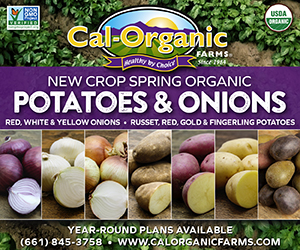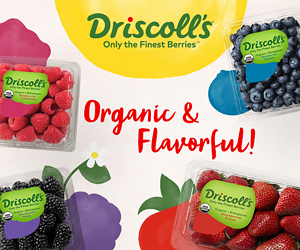Steve Ela, a longtime organic farmer and former National Organic Standards Board (NOSB) member, has been the NOSB specialist for the National Organic Coalition, a nonprofit alliance of organic stakeholder organizations, since 2022. He recently attended the Fall NOSB Meeting and is preparing for the Spring Meeting this April.
“The Fall Meeting was highlighted by high-level discussions on organic fraud, crop insurance, and support for growers transitioning to organic,” Ela said. “The NOSB sought public comment on how these USDA tools could better support organic growers and will use those comments to develop actual proposals for the upcoming Spring Meeting.”

Steve Ela facilitating a Q&A with Dr. Jenny Tucker (Deputy Administrator of the USDA-National Organic Program) at the Pre-NOSB Meeting in Atlanta, Georgia April 24, 2023.
Going into the Fall Meeting, Ela said the National Organic Coalition (NOC) had submitted comments on a number of issues, including the risk of NOP-prohibited methods in seeds used for organic production; the allowance of harmful inert materials in organic pesticide formulations; and the biodegradability of bio-based plastic mulch film.

“We continue to have concerns about the creep of excluded methods into seed production,” Ela said. “There is an allowance for non-organic seeds to be used when an organic seed is not available in form or quantity, as long as there is an affidavit that the seeds are not treated with prohibited substances or are created using excluded methods. Since there have been recent developments where certain genetic alterations do not need to be disclosed or labeled, we have concerns that there could be an introduction of seeds developed by excluded methods into organic production.”
In terms of the issue of inert materials used in organic pesticide products, Ela explained that the NOP’s current allowance for inert ingredients relies on now-defunct EPA lists. “Those listings must be updated,” he said. “We also know that some of the ‘inerts’ allowed from those defunct lists are endocrine disruptors and carcinogens and may not belong in organic products. Since inert materials may comprise a majority of a pesticide formulation, we submitted comments to the NOSB that these inert materials be more specifically reviewed for their necessity and human and environmental health effects.”
"The Fall Meeting was highlighted by high-level discussions on organic fraud, crop insurance, and support for growers transitioning to organic." - Steve Ela
Ela said the NOC and others in the organic industry are concerned that biodegradable bio-based plastic mulch film might not degrade properly or in a timely manner in farming environments. (These concerns are related to future products as there is not yet a biodegradable bio-based plastic mulch film on the market for use in organic production.) “If it doesn’t degrade, then we have the plastic contamination of our soils and ecosystems,” he said. “We don’t want a material that is supposed to solve environmental issues to actually end up contributing to other environmental issues.” And he said the NOC is also concerned about NOP-excluded methods (e.g., employing bioengineered bacteria) being used to formulate bio-based plastic mulch.
On a related note, Ela shared that during the Fall Meeting, the NOSB voted for the continued allowance of plastic mulch (the non-biodegradable kind) in organic production after “extensive discussion.”
“The use of plastic mulch was approved for continued use in organic production, but the Board noted the difficulties of applying and disposing of the plastic mulch and covers,” he said. “With climate change, the use of plastics for crop protection is increasing, and for some areas and some produce, their use can be critical to particular growers. The NOSB recognized this in their approval for continued use but also noted that they would like to continue to look for other viable alternatives that are compatible with organic production.”

Steve Ela greeting farmer panelist Jorge Marzuca and Daniela Marques (Whitemarz Farm) at the Pre-NOSB Meeting in Providence, Rhode Island on October 23, 2023.
Ela said that during the Fall Meeting, the NOSB voted to continue to allow stabilized liquid fish products in organic production, though the Board noted that there are environmental and ecosystem-related concerns surrounding harvesting fish for those products, which is something the NOC has submitted comments on.
“The Board also approved a list of organic research priorities for crop production,” Ela said. “This is an annual process, and these priorities are sent to NIFA [National Institute of Food and Agriculture] for inclusion in their research priorities for funds through various research grant programs.”

Steve Ela and other NOSB Members at the Spring 2019 NOSB Meeting in Seattle, Washington.
Looking ahead to the Spring Meeting, Ela said, “The NOSB will have proposals for ideas to improve organic crop insurance and ways to better support transitioning organic growers. They will be discussing research priorities for the upcoming year. The Board is also reviewing a petition to change the compost practice standards. They will likely be asking for public comment on these proposed changes, including whether compostable plastics should be allowed in organic compost and the temperatures and turning times required for production of organic compost. And they will begin their sunset review of the next set of organic materials on the National List. Of particular interest to produce growers are the reviews of hydrogen peroxide, horticultural oils, and pheromones.”
“[At the Spring Meeting, the NOSB] will begin their sunset review of the next set of organic materials on the National List. Of particular interest to produce growers are the reviews of hydrogen peroxide, horticultural oils, and pheromones.” - Steve Ela
Ela said the NOC’s priorities for its future NOSB-related work include the inert materials issue, organic seed production (including the need for regionally and climatically adapted varieties), and equity and inclusion in the organic landscape.
“We are working to make sure that organic production is a viable option to a wider diversity of growers, whether it be tribal members, underserved populations, and those that have been historically excluded from USDA programs,” he said, adding that another NOC effort is ensuring that NOP standards are applied equally to all sizes and types of growers.

Pre-NOSB meetings participants sit around a hollow square, to encourage equal participation and engagement (picture from the Providence Pre-NOSB Meeting on October 23, 2023).
Ela said the NOC is also working to “create ways for farmers to have a stronger voice in the NOSB comment process.”
Reflecting on the state of the organic industry, Ela highlighted a need for more research. “I know that if we invested the research dollars into organics that have been invested in conventional methods, we would see dramatic leaps forward in methods and production,” he said. “There are so many choices that organic growers make somewhat blindly because there is a lack of research into how our production systems are integrated with ecosystem cycles. I firmly believe that the organic movement’s mantra of ‘continuous improvement’ is meaningful—we don’t have all the answers now, but we should continue to look for better, more healthful, more environmentally benign ways of growing the food we all need.”






